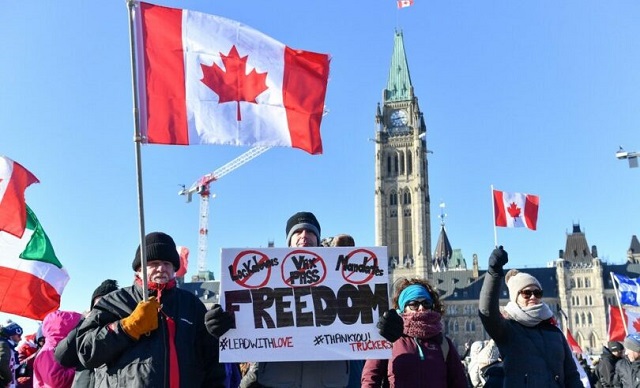Business
Trudeau gov’t to appeal federal court ruling that overturned ban on single-use plastics

From LifeSiteNews
‘Our government intends to appeal the Federal Court’s decision and we are exploring all options to continue leading the fight against plastic pollution,’ Environment Minister Steven Guilbeault announced
The Trudeau government is set to appeal the recent decision which ruled the plastics ban to be “unreasonable and unconstitutional.”
On November 20, Environment Minister Steven Guilbeault announced that the Liberal government under the leadership of Prime Minister Justin Trudeau will appeal the Federal Court’s ruling which overturned its ban on various plastics.
“Our government intends to appeal the Federal Court’s decision and we are exploring all options to continue leading the fight against plastic pollution,” Guilbeault said in a joint statement with Minister of Justice and Attorney General Arif Virani.
“We will continue working with provinces, territories, civil society, and industry to tackle this growing problem,” the statement continued.
Plastics harm our environment.
Our government will continue to lead the fight against plastic pollution.
Read Minister @viraniarif and my recent statement here 👇 pic.twitter.com/x7rCKjbgSa
— Steven Guilbeault (@s_guilbeault) November 20, 2023
Guilbeault’s comments come in response to a November 16 ruling by the Federal Court that determined that the Trudeau government overstepped its authority by classifying plastic as “toxic” and banning all single-use plastic items, like straws.
The decision came after a lawsuit filed a little over a year ago by Alberta and Saskatchewan. The ruling declared that listing all plastics on the List of Toxic Substances was too broad and “poses a threat to the balance of federalism as it does not restrict regulation to only those (plastics) that truly have the potential to cause harm to the environment.”
The court further reminded the Trudeau federal government of the autonomy of the provinces, saying, “Cooperative federalism recognizes that the provincial government and federal government are coordinate – the provinces are not subordinate to the federal government. A federal head of power cannot be given a scope that would eviscerate a provincial legislative competence.”
Essentially, the ruling overturned Trudeau’s 2022 law which outlawed manufacturing or importing plastic straws, cutlery, and checkout bags on the grounds of government claims that plastic was having a negative effect on the oceans. In reality, most plastic pollution in the oceans comes from a few countries, like India and China, which dump waste directly on beaches or rivers.
If not for the Federal Court’s ruling, the sale of these plastic products would have also been illegal by the end of this year.
“Canadians are rightly calling for action, because the rate of plastic pollution is unsustainable, threatening irreversible harm to the health of our natural world and humanity,” the memo claimed. “The accumulation of plastic pollution worldwide is nothing short of a crisis that has brought countries together to propose ambitious global solutions to this problem.
While Guilbeault claims to be responding to Canadians’ desire to reduce pollution, his statement, posted to X (formerly Twitter), has been received with ridicule from Canadians.
“Cope harder, Steven. Your air travel alone causes more pollution than plastic straws,” a Canadian Armed Forces combat veteran wrote.
Hahaha.
Cope harder, Steven. Your air travel alone causes more pollution than plastic straws.
— Muninn the Expert – Trust me (@Muninn18085831) November 20, 2023
“Hypocrites! Trudeau is responsible for the lions share of this [pollution],” another declared.
My statement here
👇🏽Hypocrites! Trudeau is responsible for the lions share of this. 🛫🛬🛫🛬🛫🛬🛫🛬🛫🛬🛫🛬🛫🛬🛫 pic.twitter.com/ckMuM2iAIt
— Mike (@midnightriderV2) November 20, 2023
Another pointed out that banning plastics, such as plastic grocery bags may not actually reduce pollution, saying, “I think plastic bags are quite useful. I carry stuff home in them, then I am able to use them as garbage bags, saving me from buying bags to do so. Also, they stop us from needing to chop down trees to make paper bags. Now I have to buy Glad kitchen catcher garbage bags. How does this help the environment again?”
I think plastic bags are quite useful. I carry stuff home in them, then I am able to use them as garbage bags, saving me from buying bags to do so. Also, they stop us from needing to chop down trees to make paper bags. Now I have to buy glad kitchen catcher garbage bags. How… pic.twitter.com/Naip2B7cs0
— Warren Irwin (@ItsWarrenIrwin) November 21, 2023
Automotive
Red States Sue California and the Biden Administration to Halt Electric Truck Mandates

From Heartland Daily News
By Nick Pope
“California and an unaccountable EPA are trying to transform our national trucking industry and supply chain infrastructure. This effort—coming at a time of heightened inflation and with an already-strained electrical grid—will devastate the trucking and logistics industry, raise prices for customers, and impact untold number of jobs across Nebraska and the country”
Large coalitions of red states are suing regulators in Washington, D.C., and California over rules designed to effectively require increases in electric vehicle (EV) adoption.
Nebraska is leading a 24-state coalition in a lawsuit against the Environmental Protection Agency’s (EPA) recently-finalized emissions standards for heavy-duty vehicles in the U.S. Court of Appeals for the D.C. Circuit, and a 17-state coalition suing the state of California in the U.S. District Court for the Eastern District of California over its Advanced Clean Fleet rules. Both regulations would increase the number of heavy-duty EVs on the road, a development that could cause serious disruptions and cost increases across the U.S. economy, as supply chain and trucking sector experts have previously told the Daily Caller News Foundation.
“California and an unaccountable EPA are trying to transform our national trucking industry and supply chain infrastructure. This effort—coming at a time of heightened inflation and with an already-strained electrical grid—will devastate the trucking and logistics industry, raise prices for customers, and impact untold number of jobs across Nebraska and the country,” Republican Nebraska Attorney General Mike Hilgers said in a statement. “Neither California nor the EPA has the constitutional power to dictate these nationwide rules to Americans. I am proud to lead our efforts to stop these unconstitutional attempts to remake our economy and am grateful to our sister states for joining our coalitions.”
(RELATED: New Analysis Shows Just How Bad Electric Trucks Are For Business)
While specifics vary depending on the type of heavy-duty vehicle, EPA’s emissions standards will effectively mandate that EVs make up 60% of new urban delivery trucks and 25% of long-haul tractors sold by 2032, according to The Wall Street Journal. The agency has also pushed aggressive emissions standards for light- and medium-duty vehicles that will similarly force an increase in EVs’ share of new car sales over the next decade.
California’s Advanced Clean Fleet rules, meanwhile, will require that 100% of trucks sold in the state will be zero-emissions models starting in 2036, according to the California Air Resources Board (CARB). While not federal, the California rules are of importance to other states because there are numerous other states who follow California’s emissions standards, which can be tighter than those required by the EPA and other federal agencies.
Critics fear that this dynamic will effectively enable California to set national policies and nudge manufacturers in the direction of EVs at a greater rate and scale than the Biden administration is pursuing.
Trucking industry and supply chain experts have previously told the DCNF that both regulations threaten to cause serious problems for the country’s supply chains and wider economy given that the technology for electric and zero-emissions trucks is simply not yet ready to be mandated at scale, among other issues.
Neither CARB nor the EPA responded immediately to requests for comment.
Nick Pope is a contributor to The Daily Caller News Service.
Originally published by The Daily Caller. Republished with permission.
Business
Economic progress stalling for Canada and other G7 countries

From the Fraser Institute
By Jake Fuss
For decades, Canada and other countries in the G7 have been known as the economic powerhouses of the world. They generally have had the biggest economies and the most prosperous countries. But in recent years, poor government policy across the G7 has contributed to slowing economic growth and near-stagnant living standards.
Simply put, the Group of Seven countries—Canada, France, Germany, Italy, Japan, the United Kingdom and the United States—have become complacent. Rather than build off past economic success by employing small governments that are limited and efficient, these countries have largely pursued policies that increase or maintain high taxes on families and businesses, increase regulation and grow government spending.
Canada is a prime example. As multiple levels of government have turned on the spending taps to expand programs or implement new ones, the size of total government has surged ever higher. Unsurprisingly, Canada’s general government spending as a share of GDP has risen from 39.3 per cent in 2007 to 42.2 per cent in 2022.
At the same time, federal and provincial governments have increased taxes on professionals, businessowners and entrepreneurs to the point where the country’s top combined marginal tax rate is now the fifth-highest among OECD countries. New regulations such as Bill C-69, which instituted a complex and burdensome assessment process for major infrastructure projects and Bill C-48, which prohibits producers from shipping oil or natural gas from British Columbia’s northern coast, have also made it difficult to conduct business.
The results of poor government policy in Canada and other G7 countries have not been pretty.
Productivity, which is typically defined as economic output per hour of work, is a crucial determinant of overall economic growth and living standards in a country. Over the most recent 10-year period of available data (2013 to 2022), productivity growth has been meagre at best. Annual productivity growth equaled 0.9 per cent for the G7 on average over this period, which means the average rate of growth during the two previous decades (1.6 per cent) has essentially been chopped in half. For some countries such as Canada, productivity has grown even slower than the paltry G7 average.
Since productivity has grown at a snail’s pace, citizens are now experiencing stalled improvement in living standards. Gross domestic product (GDP) per person, a common indicator of living standards, grew annually (inflation-adjusted) by an anemic 0.7 per cent in Canada from 2013 to 2022 and only slightly better across the G7 at 1.3 per cent. This should raise alarm bells for policymakers.
A skeptic might suggest this is merely a global phenomenon. But other countries have fared much better. Two European countries, Ireland and Estonia, have seen a far more significant improvement than G7 countries in both productivity and per-person GDP.
From 2013 to 2022, Estonia’s annual productivity has grown more than twice as fast (1.9 per cent) as the G7 countries (0.9 per cent). Productivity in Ireland has grown at a rapid annual pace of 5.9 per cent, more than six times faster than the G7.
A similar story occurs when examining improvements in living standards. Estonians enjoyed average per-person GDP growth of 2.8 per cent from 2013 to 2022—more than double the G7. Meanwhile, Ireland’s per-person GDP has surged by 7.9 per cent annually over the 10-year period. To put this in perspective, living standards for the Irish grew 10 times faster than for Canadians.
But this should come as no surprise. Governments in Ireland and Estonia are smaller than the G7 average and impose lower taxes on individuals and businesses. In 2019, general government spending as a percentage of GDP averaged 44.0 per cent for G7 countries. Spending for governments in both Estonia and Ireland were well below this benchmark.
Moreover, the business tax rate averaged 27.2 per cent for G7 countries in 2023 compared to lower rates in Ireland (12.5 per cent) and Estonia (20.0 per cent). For personal income taxes, Estonia’s top marginal tax rate (20.0 per cent) is significantly below the G7 average of 49.7 per cent. Ireland’s top marginal tax rate is below the G7 average as well.
Economic progress has largely stalled for Canada and other G7 countries. The status quo of government policy is simply untenable.
Author:
-

 City of Red Deer2 days ago
City of Red Deer2 days agoCity Council paving the way for more house suites, backyard suites, tiny homes, and duplexes
-

 Uncategorized1 day ago
Uncategorized1 day agoRCMP recruitment failure has Alberta advocacy group calling for Provincial Police Service
-

 Automotive10 hours ago
Automotive10 hours agoGovernments in Canada accelerate EV ‘investments’ as automakers reverse course
-

 Health1 day ago
Health1 day agoPrivate Footage Reveals Leading Medical Org’s Efforts To ‘Normalize’ Gender Ideology
-

 COVID-1921 hours ago
COVID-1921 hours agoJapan’s most senior cancer doctor: COVID shots are ‘essentially murder’
-

 Economy13 hours ago
Economy13 hours agoBiden signs suicidal ‘No Coal’ pact, while rest of world builds 1,000 new plants
-

 Health1 day ago
Health1 day agoTHE WPATH TAPES: Behind-The-Scenes Recordings Reveal What Top Gender Doctors Really Think About Sex Change Procedures
-

 COVID-191 day ago
COVID-191 day agoTrudeau government only sought legal advice after Emergencies Act was invoked, records indicate







